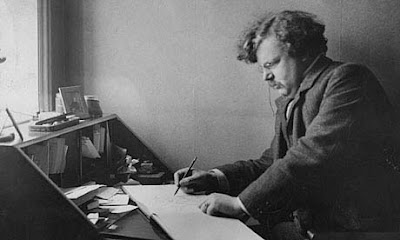Whenever I have reflected on the parable of the Prodigal Son in Luke 15, my focus has been on the younger son. We are presented with two sons, of course, but my life experience has always tracked with the prodigal; the elder son became a kind of peripheral character.
But there is a third figure in this story, and that is the father himself. For the past decade my kids have been little, so our lives revolved around diapers, tantrums, and keeping them from whacking their heads. I was a father, sure, but in that initial stage of fatherhood.
Now that my son is ten going on eighteen, I'm beginning to wrestle with different issues now--the difficulty in relating to him, connecting with him, navigating the moodiness and sometimes disrespect, and sensing a growing distance between us that I struggle to address. I don't think it's anything out of the ordinary for a parent, but it still weighs on me. I'm proud of him in so many ways--he is an accomplished thespian and serves at Mass, among other things--and feel I tell him that I love him and am proud of him often. But suddenly, that archetype of being a runaway son has shifted and I am now sitting in the father's seat bracing for the day my son wishes I was dead already and slams the front door behind him on his way out.
In our circle of orthodox, solid, Catholic homeschooling families I think there can be this temptation that our children are a reflection of us as parents that gets held up in the community. If our kids are "good," we're doing something right--teaching, catechizing, and raising them well, a badge of honor. If one of our kids go off the rails, there's not only the pain of estrangement and feeling helpless, but the shame of what it looks like to those in our circles.
I think this is a projected fear--of being judged or whispered about--that is overstated. Most of the inner shame of our failings as parents is seen in scarlet through our own eyes, and the regret can be bitter, "If only I had spent more time with him. If only I had been more intentional about catechizing her. If only I hadn't yelled so much, lost my temper so easily. If only I had been a better dad."
I have a buddy who I get beers with every now and again; I can tell when he needs some encouragement because he feels the weight of his four boys trying behavior and the self-imposed feeling that it reflects poorly on him as a father, that he's doing something wrong. When he loses his patience with them, is forced to discipline them out of love and concern, when he's told them to do something a hundred times and they just don't listen, he says "this is how God must feel with me."
A friend told me a story of someone he knew back in the UK who had gone to Thailand on a trip as a twenty-something and got into drugs; he was in all aspects, a true prodigal living dissolute among the swine. His father had no idea where he was, but his care and concern prompted him to fly halfway around the world to set off and find him. He carried his picture around the streets of Bangkok, asking people if they had seen him, until one opportune moment led him to a drug den where lo and behold, his filthy, sick, strung out son was. He gathered him up, and took him home.
You don't know the love and sacrifice you are capable of until you become a parent, the fruit of your vocation.
For the father in the Lord's parable, his nobility and tender character would seem to lend itself to the belief that his legacy was good stock. He gave his sons everything, was a good father to them, and still one goes off the rails and the other seethes in resentment. What went wrong? How bitter the recollection of the prophet Isaias' words in his mind, “All your children will be taught by the Lord, and great will be their peace.” (54:13) How the townsfolk must have talked when he went into the village.
None of that matters, of course, to the father. He searches the horizon day after day, and is willing to gird his loins and run in such an undignified manner to meet his returning son when he sees him in the distance--the son who had no regard for his dignity or respect for his authority--embracing him and showering him with the great good of his household. He had every right to turn from him and disown him, as the son recognizes in his rehearsed speech, "Treat me as one of your hired hands." (Lk 15:19).
The father was not a tyrant-turned-empath. His character was one of compassion, devotion, and paternal love from the beginning. It would seem that one could not blame the father for "failures" of parenting that drove his son away. The father did everything in his power, and still his heritage turned against him and made him the object of murmur within the community. The parable is as much a story of the exercise of free-will as it is of fervent love, longing, and forgiveness.
As fathers and mothers, we all have a heightened sensitivity to our parental failures. We also are subject to the temptation to comparison: "So-and-so has such good kids. They're all doing so well. And look at us."
Part of the added temptation of traditional Catholicism, I think, is "if one simply does X, Y results." Because the liturgy is constant and unchanging, and the rubrics a protection against abuse, I suspect that there may be a tendency to internalize this and apply it to our children. "If we attend the Latin Mass every Sunday, if we don't fraternize with pagans, if we homeschool, etc., our children will not turn away." And for some, that may be the case.
And yet when I reflect on the good father in the parable, he seemed to have done everything right, and his son(s) still strayed...and not only in slight, but in complete dissolution. Is the father the one to blame for the sons indiscretions? Did he spare the rod and pay the price for this dereliction of duty? Was he emotionally distant? Too protective? Not protective enough?
Or is it simply the exercise of that awesome and fearful gift of freewill that God entrusts each of us? That gift that we can use against Him, just as our children may use against us one day despite our best efforts to keep them on the straight and narrow? It's uncomfortable to think that our control as parents is in many ways, illusionary. We set boundaries, we do our best without a Missal for Parents, and still sometimes the rubrics aren't enough and our children stray for whatever reason. I would ratchet it as one of life's great and tragic mysteries that can even lead some parents to the brink of despair. Parenting is not an "A+B=C" affair. There are a lot of unaccounted for variables.
My darkest nights as a parent are when everything seems to be drifting, and I don't know how to reign it back to the way it was. I experience a loss of control and am driving in the dark with no headlights. I miss my son; I don't want to lose him. In these times, my faith in the paternal love of God is all I have.
Our lives as Christians are founded on the hope of resurrection and ultimate redemption. We know no son or daughter is beyond God's mercy and saving grace, no matter how lost or fargone. As parents, it is our job to never lose that hope, to always be scanning the horizon in prayerful anticipation of that homecoming, to run out and embrace when they are still a long way off, and relish the miraculous joy of the dead coming back to life.







